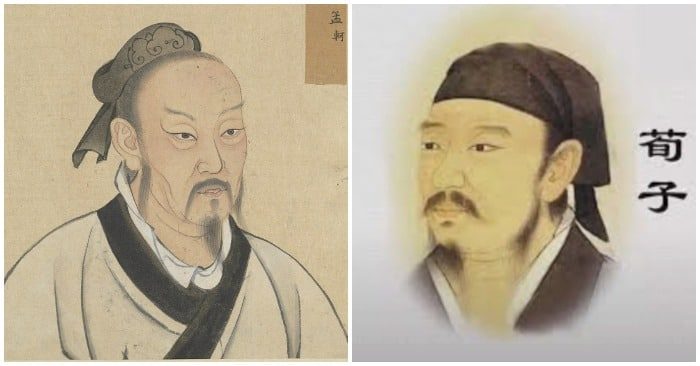Confucius, a towering figure in the annals of world philosophy, has cast a long and enduring shadow over the cultural and intellectual landscape of East Asia for over two millennia.
In his teachings, Confucius articulated a comprehensive moral philosophy that sought to guide both personal conduct and political governance. His emphasis on humaneness, ritual propriety, filial piety, and the cultivation of virtuous character underscored his holistic approach to societal harmony and stability.
Confucius’s enduring legacy is not merely the product of his philosophical doctrines but also the innovative method of their dissemination. As a devoted educator, he was among the first to advocate that education should be accessible to all, irrespective of social status. This revolutionary principle further broadened the impact of his philosophical contributions. In this article, LotusBuddhas will share with you useful information about Confucius, so that you can have a better understanding of the life and philosophy of this great philosopher.
Life of Confucius

Confucius, known in China as Kong Fuzi or Kongzi, was an eminent Chinese philosopher, teacher, and political figure, born around 551 BCE in the state of Lu, now known as the Shandong province. His enduring influence on Chinese thought and culture, encapsulated in what is now referred to as Confucianism, has extended beyond Chinese borders and persists in various forms to the present day.
Confucius was born into a family of modest means, his father dying when he was a mere toddler. These circumstances made his early life a struggle, but they also contributed to shaping his later philosophical thoughts. Despite his modest background, he was able to receive a good education, showing a deep interest in history, poetry, and rituals from an early age.
As an adult, Confucius pursued a career in public service. He held several governmental positions in the state of Lu and aimed to apply his philosophical ideals to real-world politics. His career was marked by a deep sense of morality and ethics, with a strong emphasis on personal and societal rectitude. However, he grew disillusioned with the political leaders of his time, leading him to leave his official post and embark on an extended period of traveling around China.
Throughout these travels, Confucius gathered a group of dedicated followers. He began a practice of teaching to a broad range of students, not restricted by their social status, which was quite revolutionary in the context of his time. This was an expression of one of his significant beliefs that education should be accessible to all.
Confucian philosophy is grounded in the belief that humans are fundamentally good, and that this goodness can be nurtured through education. He emphasized the concept of “ren” (humaneness), “li” (ritual propriety), and “xiao” (filial piety). He also advocated for a moral and virtuous life as the path to harmony in society and good governance.
Confucius returned to Lu in his later years and dedicated his time to teaching and writing. His philosophical ideas were not written down by himself but rather were compiled by his disciples in a work known as “The Analects,” which presents a comprehensive account of his teachings and sayings.
Confucius passed away in 479 BCE, but his teachings continued to thrive. They were later canonized during the Han dynasty (206 BCE–220 CE), becoming the ideological foundation of Chinese society. Confucianism had a significant influence on the political, ethical, and social life of China for over two millennia. Today, it continues to shape many aspects of Chinese thinking and other East Asian cultures, and its influence has spread worldwide.
Confucius remains a symbol of wisdom and a beacon of moral guidance. His life and teachings highlight the transformative power of education and the importance of moral integrity. His profound influence on human thought attests to his significance as a philosopher and a pivotal figure in world history.
About Confucianism
Confucianism is a philosophical and ethical system that originated in China around 2,500 years ago. It is named after its founder, Confucius (551-479 BCE), a Chinese philosopher and teacher who developed a system of thought that emphasized the importance of personal and governmental morality, justice, sincerity, and the cultivation of knowledge and virtue.
Confucianism emphasizes the importance of social relationships, including respect for elders, loyalty to family and friends, and the role of the individual in society. It has had a profound influence on Chinese culture and society, and has also spread to other parts of East Asia, including Korea, Japan and Vietnam.
Main teachings of Confucius
Confucius’ teachings, primarily recorded in the “Analects,” can be divided into key themes: ethics, education, governance, and the role of the individual in society. His philosophy has served as a guiding principle for personal conduct, societal order, and government administration for more than two millennia.
- Ethics: At the core of Confucianism is the pursuit of moral perfection. This begins with “ren” (also translated as humaneness, benevolence, or love), an innate quality that Confucius argued all human beings possess, which should be nurtured through moral self-cultivation. “Ren” is manifested in care for others and is connected to the concept of “shu” (reciprocity), often summarized by Confucius’ saying: “Do not do unto others what you would not want others to do unto you.”
- Education: Confucius upheld education as a critical means for moral development and social advancement. He taught that education should be made accessible to all, regardless of social status, a revolutionary idea in his time. Confucius was not just an advocate for intellectual education but emphasized moral education as well. He maintained that the goal of learning should be to cultivate one’s character and promote a sense of social responsibility.
- Governance: Confucius proposed that rulers should govern by moral example rather than by the use of force. He supported the idea of a meritocratic government where officials were chosen based on their moral and intellectual qualities, not their social standing. Confucius believed that if rulers and officials behaved virtuously, their example would inspire the populace to act similarly, leading to a harmonious and orderly society.
- Role of the Individual in Society: Confucius’ teachings highlight the significance of the individual’s role in maintaining social harmony. One key concept is “li,” which refers to a system of rituals, ceremonies, and rules of propriety. “Li” instructs individuals on how to interact appropriately with others in different social contexts, thereby promoting social harmony. Closely related is the concept of “xiao” (filial piety), which emphasizes respect for one’s parents and ancestors as the basis for individual morality and societal order.
- The Five Relationships: Another central element in Confucius’ philosophy is the doctrine of the Five Relationships. These include ruler-subject, father-son, husband-wife, elder brother-younger brother, and friend-friend. Confucius held that social harmony arises when each individual understands their role within these relationships and acts accordingly. Importantly, these relationships are not one-sided; they involve duties and responsibilities on both sides.
These teachings of Confucius, emphasizing moral virtues, familial respect, social harmony, education, and righteous governance, have had a profound influence on East Asian societies and continue to be relevant in modern discourse on ethics, education and politics.
Significance of Confucius in Chinese history
Confucius holds an unparalleled position in Chinese history, having had a profound influence on Chinese civilization for more than two millennia. His significance is manifold, touching upon the realms of philosophy, education, morality and governance.
Philosophy: Confucius’ philosophical system, known as Confucianism, provided a moral and ethical framework that shaped the conduct of individuals and the operations of the state in China. His teachings, particularly those on ethics, societal roles, and governance, were woven into the fabric of Chinese culture and continue to influence it to this day.
Education: Confucius elevated the role of education in Chinese society. He advocated for it as a means of moral self-cultivation and societal advancement, and his ideas laid the groundwork for the creation of a state-run education system and the civil service examinations during the Han dynasty. These exams, based on the study of Confucian classics, were a revolutionary development in their time and shaped China’s intellectual, cultural, and political life for over two millennia.
Moral code: Confucianism offered a comprehensive moral code for personal behavior and social interaction. Key concepts such as “ren” (humaneness), “li” (ritual propriety), and “xiao” (filial piety) provided guidelines for ethical conduct, familial relationships, and social roles. These values became deeply ingrained in Chinese society, contributing to its unique social and cultural character.
Governance: Confucius’ ideas on governance had a significant impact on the structure and administration of the Chinese state. His philosophy advocated for a meritocratic government and moral leadership. The ruler, he argued, should act as a moral exemplar for his subjects. This notion influenced the governance style of many Chinese dynasties and continues to be a part of the discourse on political leadership in China.
Cultural and historical symbol: Confucius has been revered as a cultural icon and a symbol of Chinese traditional values. His image has been invoked at various times in history to support different political or ideological ends, whether to promote traditionalism, defend orthodoxy, or advocate for modernization and reform. Thus, Confucius remains a potent symbol within the cultural and historical narrative of China.
30 famous Confucius quotes

Most of Confucius’ teachings illustrate the profound understanding of a Chinese thinker on practical and philosophical issues. He taught about love, family, social relationships, and how to become a good leader. He provides us with insights into life and the interrelations between things. The following is a collection of 30 notable quotes attributed to Confucius, primarily recorded in “The Analects.”
- “Our greatest glory is not in never falling, but in rising every time we fall.”
- “It does not matter how slowly you go as long as you do not stop.”
- “I hear and I forget. I see and I remember. I do and I understand.”
- “To see what is right and not to do it is want of courage, or of principle.”
- “The man who moves a mountain begins by carrying away small stones.”
- “When anger rises, think of the consequences.”
- “The superior man is modest in his speech but exceeds in his actions.”
- “The will to win, the desire to succeed, the urge to reach your full potential… these are the keys that will unlock the door to personal excellence.”
- “He who knows all the answers has not been asked all the questions.”
- “By nature, men are nearly alike; by practice, they get to be wide apart.”
- “Wheresoever you go, go with all your heart.”
- “When it is obvious that the goals cannot be reached, don’t adjust the goals, adjust the action steps.”
- “Choose a job you love, and you will never have to work a day in your life.”
- “The superior man thinks always of virtue; the common man thinks of comfort.”
- “To know what you know and what you do not know, that is true knowledge.”
- “He who learns but does not think is lost. He who thinks but does not learn is in great danger.”
- “Do not impose on others what you yourself do not desire.”
- “We should feel sorrow, but not sink under its oppression.”
- “Heaven means to be one with God.”
- “Without feelings of respect, what is there to distinguish men from beasts?”
- “He who wishes to secure the good of others has already secured his own.”
- “If you think in terms of a year, plant a seed; if in terms of ten years, plant trees; if in terms of 100 years, teach the people.”
- “Faced with what is right, to leave it undone shows a lack of courage.”
- “The superior man is distressed by the limitations of his ability; he is not distressed by the fact that men do not recognize the ability that he has.”
- “Have no friends not equal to yourself.”
- “To see the right and not to do it is cowardice.”
- “What the superior man seeks is in himself; what the small man seeks is in others.”
- “Virtue is not left to stand alone. He who practices it will have neighbors.”
- “It is more shameful to distrust our friends than to be deceived by them.”
- “A man who has committed a mistake and doesn’t correct it, is committing another mistake.”
Relationship between Confucius and Mencius
Confucius and Mencius, two of the most celebrated philosophers in Chinese history, have been linked through their shared philosophical tradition, known as Confucianism. However, it’s important to clarify that they were not contemporaries and did not have a personal relationship. Confucius, born in 551 BCE, predates Mencius, who was born roughly a century later in 372 BCE. Their connection is established through the continuity and expansion of philosophical thought, with Mencius regarded as a principal interpreter and developer of Confucius’s ideas.
Mencius, born Meng Ke, is often considered the “Second Sage” in the Confucian tradition. He did not directly study under Confucius but was a disciple of Confucius’s grandson, Zisi. This places Mencius in the fourth generation of Confucius’s intellectual lineage. Mencius diligently studied the teachings of Confucius and devoted his life to interpreting, expanding, and disseminating these teachings.
Both Confucius and Mencius advocated for moral self-cultivation and righteous governance, but Mencius further developed several aspects of Confucian thought. He deepened the concept of “ren” (benevolence) by arguing that human nature is inherently good and that moral goodness could be nurtured through proper environment and education. Mencius’s perspective was more optimistic than Confucius’s, stressing innate goodness rather than the capacity for both good and evil.
Mencius also extended Confucius’s ideas on governance. While Confucius emphasized the role of moral exemplars in leadership, Mencius went further to argue that the people have the right to overthrow a ruler who fails to provide for their well-being. This was a significant advancement in political philosophy, introducing the concept of the ruler’s responsibility towards the ruled.
In essence, Mencius played an instrumental role in perpetuating and developing Confucian thought, thereby solidifying its influence on Chinese philosophy and culture. While Confucius laid the foundation, Mencius built upon it, further enriching the Confucian tradition. Their philosophical ideas, both complementary and distinct, have been passed down through the centuries and continue to hold considerable significance in the study of Chinese philosophy and ethics.








